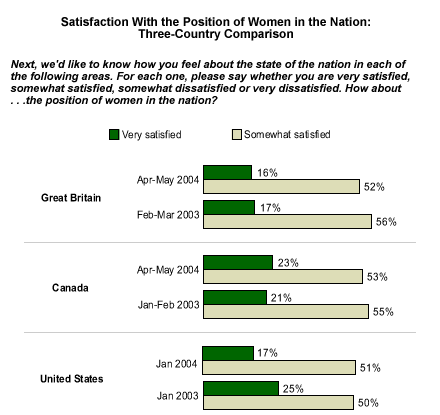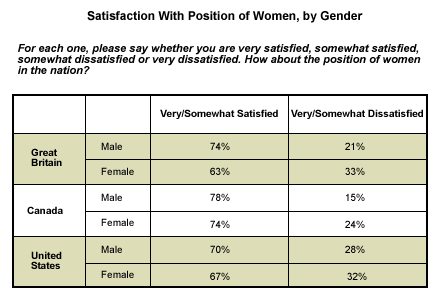In ���۴�ýPolls conducted in the United States, Canada, and Great Britain*, residents of each country were asked to rate their satisfaction with the position of women in their respective nations. While there is some divergence of opinion among residents of the three countries, the numbers affirm majority satisfaction with the status of women in all three societies.
The Great White North?
Of the three countries, Canadians are the most satisfied with the position of women. Seventy-six percent of Canadians say they are either "very satisfied" or "somewhat satisfied," compared with 68% of both Britons and Americans. Satisfaction on this issue has remained steady in Canada between 2003 and 2004, but has trended slightly downward in the United States and Great Britain. In the United States, satisfaction declined from 75% in January 2003 to 68% in January 2004. (See "Are Americans Content With Status of Women?" in Related Items.) In Great Britain, satisfaction declined from 73% to 68%.

Perception by Party ID
Respondents' political associations affect the perception of women in society. In Britain, those respondents who identified themselves as Conservatives were somewhat less satisfied than respondents who identified themselves with the Labour Party. While Conservatives voice an overall satisfaction of 67%, the percentage among Labour supporters is 74%. In the United States, there is some variance in responses by party identification. While 79% of Republicans are satisfied with the position of women in society, fewer Democrats (61%) express a similar satisfaction.
A Gender Divide in Britain
No one has a bigger stake in the position of women in the nation than the nation's women themselves. In Canada and the United States, overall satisfaction with the position of women does not vary significantly between the sexes. In Britain, however, a gender gap does exist -- 63% of women state that they are satisfied with their positions in society, compared with 74% of men who express satisfaction with the position of women. And given the recent spate of news stories highlighting gender inequality in the British workplace -- including high-profile accusations of gender discrimination in London's male-dominated financial district -- this gender divide in Britain is not entirely surprising.

*Results in the United States are based on telephone interviews with 1,004 national adults, aged 18 and older, conducted Jan. 12-15, 2004. For results based on the total sample of national adults, one can say with 95% confidence that the maximum margin of sampling error is ±3 percentage points. The survey was conducted by ���۴�ýUSA.
Results in Canada are based on telephone interviews with 1,003 national adults, aged 18 and older, conducted April 28-May 4, 2004. For results based on the total sample of national adults, one can say with 95% confidence that the maximum margin of sampling error is ±3 percentage points. The survey was conducted by ���۴�ýCanada.
Results in Great Britain are based on telephone interviews with 1,018 national adults, aged 18 and older, conducted April 29-May 12, 2004. For results based on the total sample of national adults, one can say with 95% confidence that the maximum margin of sampling error is ±3 percentage points. The survey was conducted by ���۴�ýUK.
In addition to sampling error, question wording and practical difficulties in conducting surveys can introduce error or bias into the findings of public opinion polls.
